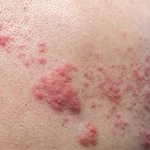(Reuters Health)—Just one in five people over age 60 in the U.S. have been vaccinated against a painful eruption of herpes zoster (shingles), despite recommendations that all of them should get the shot.
It’s estimated that among people over age 50, one in three will eventually develop shingles. After age 80, half of adults have had shingles.
“The rash usually heals within two to four weeks; however, some people develop ongoing nerve pain which can last for months or even years,” says lead author Dongmu Zhang of Merck and Co., Inc., a New Jersey-based pharmaceutical company that makes a shingles vaccine.
“Vaccination of appropriate adults may help to prevent or attenuate herpes zoster,” Zhang says by email, adding that the Center for Disease Control and Prevention recommends it for all adults over 60.
The vaccine is also approved for people aged 50–59, though guidelines stop short of recommending it for that age group. The federal government’s Healthy People 2020 initiative set a goal of having 30 percent of people over 60 vaccinated by 2020, Zhang’s team writes in the American Journal of Preventive Medicine, online Oct. 26.¹
To determine how many older adults are getting the vaccine, the study team used data from two healthcare databases, one including nearly 7 million adults over age 60 and another with 7 million people between 50–60. Researchers looked at how many of them received the herpes zoster vaccine between 2007 and 2013.
They also looked at factors that might affect whether or not people got the vaccine, including age, sex, geographic area, health insurance type and whether or not the person had a compromised immune system.
The team found that by 2013, less than 2% of 50–60 year olds, 24% of adults between 60 and 64 and 15% of adults over 65 had received the herpes zoster vaccine.
The vaccine was first approved in 2006, and the number of people getting vaccinated each year went up between 2007 and 2013, researchers note.
Women and people with normal immune systems were more likely to receive the vaccine, as were people who visited doctors and pharmacies for regular medical care more often. But people who visited emergency departments and had inpatient hospital stays were less likely to get the vaccine.
People who got the flu vaccine were also more likely than those who didn’t to have had the herpes zoster vaccine.
Zhang’s team urges doctors to use routine health encounters like a visit for flu vaccination as opportunities to also educate people about the shingles vaccine and urge them to get it.

